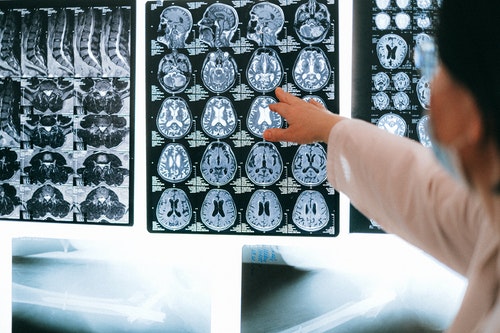Most people are familiar with feelings of sadness, discouragement, pessimism, and hopelessness. Having mild and brief feelings of sadness is actually an adaptive feature of our bodies. It tries to conserve energy in the face of unobtainable goals. When profound sadness affects a person’s everyday life for more than two weeks, this may be a sign of depression.
Classified as a mood disorder, depression involves feelings of sadness, loss, or anger that interfere with an individual’s daily functioning. Other symptoms of depression include loss of interest in normal activities, sleep disturbances, weight loss or gain, and suicidal thoughts.

Some people think that depression isn’t a real thing and that those who exhibit the symptoms are ”weak.” However, depression is a real and common condition that can be extremely debilitating if not addressed. According to the World Health Organization, over 264 million people globally have this mental disorder. It was even found that the depression rate has likely tripled because of the COVID-19 pandemic.
Depression doesn’t result from a single cause. Rather, it results from a complex interaction of physical, social, psychological, and biological factors. No one is exempt from being vulnerable to depression. However, people who have gone through unusual amounts of adversity are more likely to develop this condition.
Despite its capacity to significantly affect people’s lives, depression is curable, and its symptoms are manageable. Read the full article to learn more about depression and the different methods to treat this mental disorder.
What are general methods used to treat depression?
Some of the most common methods used to treat depression include psychotherapy, medication management, or a combination of both. Psychotherapy has different types, including cognitive behavioral therapy and interpersonal therapy. Some common medications prescribed to treat mental illness are antidepressants and anti-anxiety pills.
What are the 4 types of depression?
The four types of depression are the following.
- Major depression, where you experience intense loss of interest and long weeks of low moods that often lead to dark thoughts
- Persistent depression, which happens longer than major depression (around two years or more)
- Seasonal affective disorder, which, from the name itself, affects people seasonally but most especially during winters or cold weather
- Bipolar disorder, in which you only have periodic episodes of depression.
What is the new treatment for depression?
Recently, experts and researchers have found an innovative method to treat depression — neuromodulation therapy. Approved by the Food and Drug Administration (FDA), the therapy involves altering nerve activity through electromagnetic simulations. It was found that the delayed change brought upon by the method will improve the mood of those affected by depression.
Is Counselling better than antidepressants?
Comparing the two most commonly used treatments for depression, studies suggest that both are efficient methods. It’s hard to say which is better than the other since it all depends on the patient’s condition and their response to treatments. However, both counseling and antidepressants are typically used in combination.
What is the biggest cause of depression?
Research cannot precisely pinpoint what causes depression in many people. There is a combination of factors to consider that can severely affect an individual’s psychological well-being. However, in one study, it was found that brain changes might be the most significant cause of depression. These changes include genetic vulnerability and chemical imbalances in mind.
What is the best medicine for depression?
Selecting the right antidepressant for an individual is a crucial process in treating depression. Each person responds to medicines differently. But many doctors prescribe the type of antidepressants called selective serotonin reuptake inhibitors (SSRIs), which are found to have fewer or milder side effects.
What happens in the brain during depression?
Studies have determined that people’s brains, who are depressed, have a smaller hippocampus, which is the part of the brain that releases stress hormones. As a result, the amygdala also becomes affected. This is the part of the brain related to recalling memories, especially the bad ones. If the amygdala becomes activated due to stress hormones’ release, people are more vulnerable to depression. The rest of the brain follows suit.
Which type of depression is the most common type of mood disorder?
Major depression is considered to be the most common type of depression in mood disorder. It manifests by having frequent low moods, loss of interest, and feeling hopeless in a few weeks. Other symptoms of this type of depression also include trouble sleeping, weight changes, and suicidal thoughts.
Is depression classified as a disease?
Mental illnesses, such as depression, are classified as diseases. They are disorders or medical problems that affect many people and reduce the quality of life, just like a heart disease would.
Is there a happy pill?
In the United States, some anxiety medications and antidepressants are considered happy pills. It is a slang term, earning its name from how it works, improving a person’s mood.

Do antidepressants help with confidence?
While antidepressants mainly work as inhibitors or suppressors of negative ones, they may help create a positive outlook in an individual’s life, like gaining self-confidence. The result is different for every people.
Which age group has the highest rate of depression?
According to statistics, the young adults’ age group of 18 to 25 have the highest rate of depression. It is also suggested that young female adults are more likely to experience mental disorders than young male adults.
Is memory loss a symptom of depression?
As depression is a condition that affects the brain, it is no doubt that in some cases, it can cause memory loss. It can be challenging for some people to recall specific memories or even completely forget they even ever happened.
Is depression a side effect of diabetes?
People with diabetes, primarily type 1 or 2, do not necessarily have depression as a side effect. However, mental illness is linked to these kinds of people. The research found out that those with diabetes have an increased risk of developing depression.
How does depression affect synapse?
The brain’s reduced size in people with depression has developed something called a synaptic dysfunction, which means that it will be challenging and demanding for the brain to regulate mood and condition as it usually would.
Aside from the typical treatment methods, engaging in self-help and healthy habits helps reduce the symptoms of depression. Among these habits are getting enough sleep, eating a well-balanced diet, and avoiding drugs and alcohol. Regular exercise and building strong relationships with other people also help in creating positive feelings and improving mood.
It’s important to note that these coping strategies don’t guarantee recovery from depression. It works best with prescribed treatments to maximize benefits and prevent relapses.

While depression isn’t generally considered preventable, there are techniques to avoid depressive episodes. These techniques include cutting back on social media time, minimizing daily choices, and practicing mindfulness or meditation to cope with stress.
There are certain unavoidable events, such as death anniversaries, that can trigger a depression relapse. However, knowing these triggers and planning for them can help in preemptive coping. To plan for these triggers, you can first brief yourself on what’s coming up and what it will entail. You can also make plans with a loved one or ask someone to check in with you. Lastly, remind yourself that you capable of getting through the event.
If you’ve been experiencing symptoms of depression and have had no history of the condition, it’s best to check in with your primary care physician. In some cases, symptoms of depression can be related to another physical condition. If possible, tell your doctor the specific details about your symptoms. Try to note and mention:
- When you first noticed your symptoms
- How they’ve affected your everyday life
- Any other mental conditions
- Any information about a family history of mental illness
- All medications, supplements, and herbs you’re currently taking (prescription and over-the-counter)
Giving your doctor a detailed account of your symptoms will help them provide a more accurate diagnosis. This will also ensure that they make a proper referral to a mental health professional.
If you or someone you know is currently struggling with depression, remember that depression is treatable and that help is available.